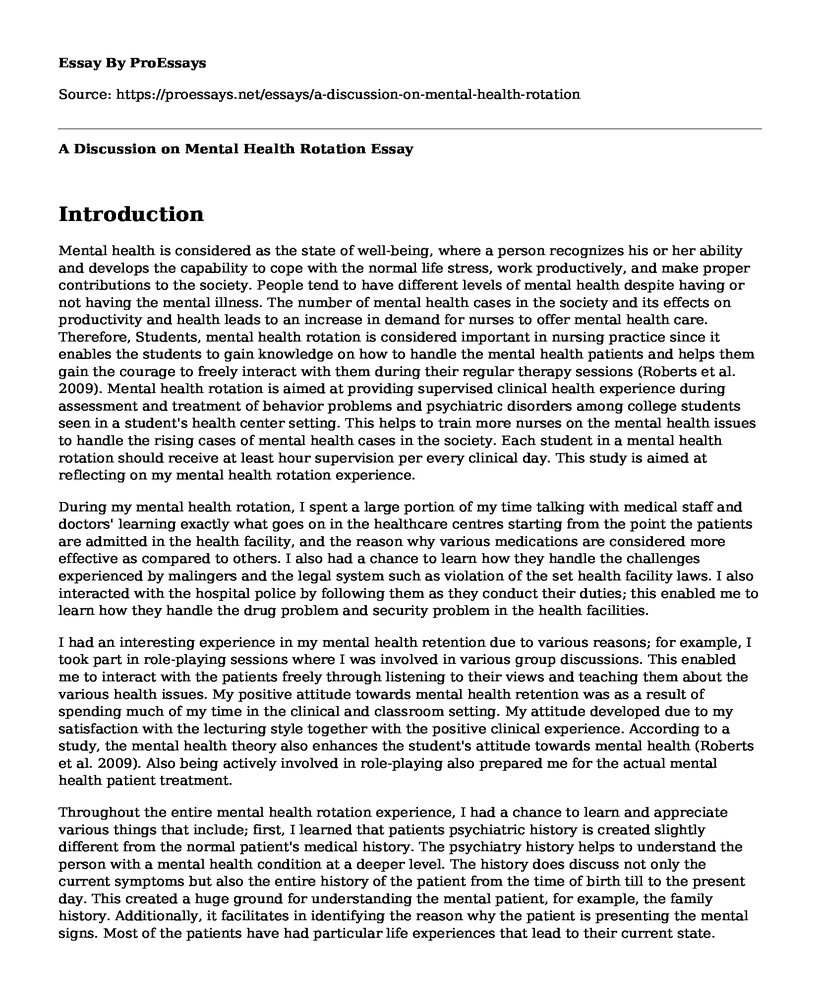Introduction
Mental health is considered as the state of well-being, where a person recognizes his or her ability and develops the capability to cope with the normal life stress, work productively, and make proper contributions to the society. People tend to have different levels of mental health despite having or not having the mental illness. The number of mental health cases in the society and its effects on productivity and health leads to an increase in demand for nurses to offer mental health care. Therefore, Students, mental health rotation is considered important in nursing practice since it enables the students to gain knowledge on how to handle the mental health patients and helps them gain the courage to freely interact with them during their regular therapy sessions (Roberts et al. 2009). Mental health rotation is aimed at providing supervised clinical health experience during assessment and treatment of behavior problems and psychiatric disorders among college students seen in a student's health center setting. This helps to train more nurses on the mental health issues to handle the rising cases of mental health cases in the society. Each student in a mental health rotation should receive at least hour supervision per every clinical day. This study is aimed at reflecting on my mental health rotation experience.
During my mental health rotation, I spent a large portion of my time talking with medical staff and doctors' learning exactly what goes on in the healthcare centres starting from the point the patients are admitted in the health facility, and the reason why various medications are considered more effective as compared to others. I also had a chance to learn how they handle the challenges experienced by malingers and the legal system such as violation of the set health facility laws. I also interacted with the hospital police by following them as they conduct their duties; this enabled me to learn how they handle the drug problem and security problem in the health facilities.
I had an interesting experience in my mental health retention due to various reasons; for example, I took part in role-playing sessions where I was involved in various group discussions. This enabled me to interact with the patients freely through listening to their views and teaching them about the various health issues. My positive attitude towards mental health retention was as a result of spending much of my time in the clinical and classroom setting. My attitude developed due to my satisfaction with the lecturing style together with the positive clinical experience. According to a study, the mental health theory also enhances the student's attitude towards mental health (Roberts et al. 2009). Also being actively involved in role-playing also prepared me for the actual mental health patient treatment.
Throughout the entire mental health rotation experience, I had a chance to learn and appreciate various things that include; first, I learned that patients psychiatric history is created slightly different from the normal patient's medical history. The psychiatry history helps to understand the person with a mental health condition at a deeper level. The history does discuss not only the current symptoms but also the entire history of the patient from the time of birth till to the present day. This created a huge ground for understanding the mental patient, for example, the family history. Additionally, it facilitates in identifying the reason why the patient is presenting the mental signs. Most of the patients have had particular life experiences that lead to their current state. Identifying the mentally ill patient history is also effective in assisting the doctor to determine the right medication and make a better management plan.
Secondly, I appreciated that in the mental facility it is possible to know the patient at a personal level. The students on rotation and the facility staff tend to know the patients over a period of time and at a personal level for example their by knowing their family history, thus creating trust among the patients, which helps to improve on the kind of relationship they both have towards each other. This continuous interaction helped me to gain courage when dealing with the patients since the more the patient gains trust in the nurse the less likely he or she may harm the nurse attending her. In addition gaining trust enabled the mentally ill patients to share with me any challenge they faced and I would be of service to them.
Conclusion
Despite most of my fellow colleges not being interested in mental health, they also ended up enjoying their mental health rotations. Therefore, the students undertaking retention should be open-minded and avoid other people's negative views instead they should consider viewing for them, what mental health rotation entails. No matter the specialty the health students choose, they will not avoid learning about mental illness. In this field there are also other vital skills to learn about that can be transferred to other specialties.
References
Roberts, K. T., Robinson, K. M., Stewart, C., & Smith, F. (2009). An integrated mental health clinical rotation. Journal of Nursing Education, 48(8), 454-459.
Cite this page
A Discussion on Mental Health Rotation. (2022, Aug 08). Retrieved from https://proessays.net/essays/a-discussion-on-mental-health-rotation
If you are the original author of this essay and no longer wish to have it published on the ProEssays website, please click below to request its removal:
- Soren Kierkegaard's Thoughts on Truth and Subjectivity
- The Link Between Transformational Leadership and Emotional Intelligence
- Essay on Caring for Adolescents and Young Adults: Addressing Risks With Therapeutic Interventions
- Essay Example on John and Emma: Benefits and Harms of Counselling Relationship
- Essay Example on Global Crisis: The Unending Battle Against Disease
- Drug Abuse & Adolescents: West Palm Beach, FL - Essay Sample
- Essay Sample on Modern Theorists: Prahalad & Mintzberg's Focus on Human Interactions







